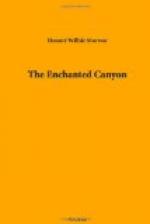His mind was less calm than it had been the day before, and his thinking less orderly. He had begun to be nagged by recollections of office details that he should have settled, of important questions that awaited his decision. And something deep within him began to tell him that he was not playing a full man’s part in running away. But to this he replied grimly that he was only seeking for strength to go back. And finally he muttered that give him two weeks’ respite and he would go back, strength or no strength. And over and about all his broken thinking played an unceasing sense of loss. The public had invaded his last privacy. The stronghold wherein a man fights his secret weakness should be sacred. Not even a clergyman nor a wife should invade its precincts uninvited. Enoch’s inner sanctuary had been laid open to the idle view of all the world. The newspaper reporter had pried where no real man would pry. The Brown papers had published that from which a decent editor would turn away for very compassion. Only a very dirty man will with no excuse whatever wantonly and deliberately break another man.
When toward sundown Enoch saw a thread of smoke rising far ahead of him, again his first thought was to stop and make camp. He wished that it were possible for him to spend the next few weeks without seeing a white man. But he did not yield to the impulse and Pablo pushed on steadily.
The camp was set in the shelter of a huge rock pile, purple, black, yellow and crimson in color, with a single giant ocotilla growing from the top. A man in overalls was bending over the fire, while another was bringing a dripping coffee pot from a little spring that bubbled from under the rocks. A number of burros were grazing among the cactus roots.
Enoch rode up slowly and dismounted stiffly. “Good evening,” he said.
The two men stared at him frankly. “Good evening, stranger!”
“John Red Sun told me to ask you people for work in return for permission to trail with your outfit.”
“Oh, he did, did he!” grunted the older man, eying Enoch intently. “My name is Mackay, and my pardner’s is Field.”
“Mine is Smith,” said Enoch.
“Just Smith?” grinned the man Field.
“Just Smith,” repeated Enoch firmly.
“Well, Mr. Just Smith,” Mackay nodded affably, as though pleased by his appraisal of the newcomer, “wipe your feet on the door mat and come in and have supper with us. We’ll talk while we eat.”
“You’re very kind,” murmured Enoch. “I—er—I’m a tenderfoot, so perhaps you’d tell me, shall I hobble this horse or—”
“I’ll take care of him for you,” said Field. “You look dead tuckered. Sit down till supper’s ready.”




